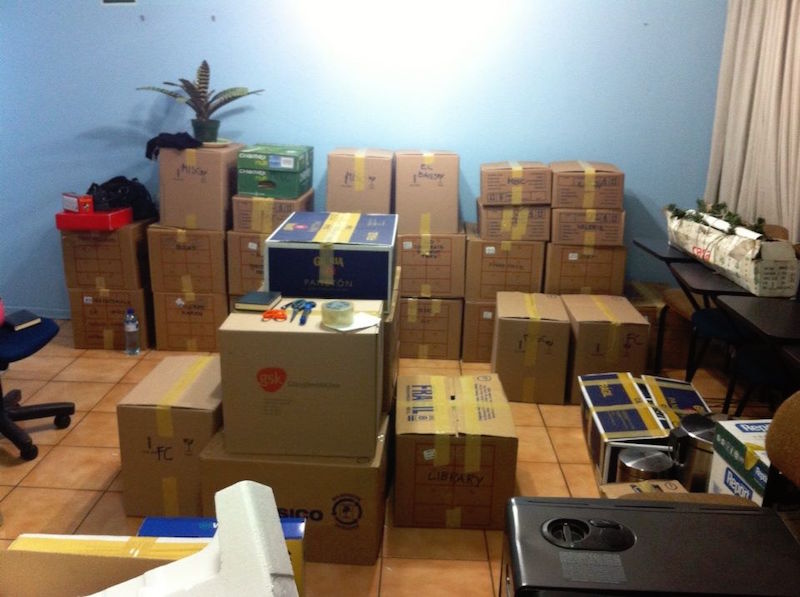
A reflection of Claudiaexpat on what is commonly defined as culture shock.
Culture shock is a familiar term. It’s like a powerful shock that jolts you when you have to face things that are culturally unfamiliar. During my workshops I have found that in the collective expatriate mind the term evokes powerful and sometimes violent images, for example, of a person in a pot surrounded by cannibals, a pet python, or crowds of strangely-dressed men behaving bizarrely. What is commonly referred to as culture shock refers to a process that can develop over a long period of time, and be either outwardly recognisable as such, or appear to be part of each person’s natural “baggage”.
Culture shock is a deep and intimate experience that can vary in intensity and duration from one individual to the next. For some it is grim, others don’t even realize they are experiencing it.
Culture shock can be defined as the initial process of adaptation to a unfamiliar culture. It derives from the interaction with people and objects of different cultures, and provokes positive or negative cognitive and/or emotional reactions, a feeling of loss of all reference points, lowered self-esteem, and an impression of hostility from outsiders. All this can result in discomfort and anger. Entering an unknown cultural environment means being deprived of landmarks, familiar codes, established means of communication, and the safety of a protective, defining, familiar cultural structure. It is like finding yourself naked in a crowd of elegantly-dressed people.
The most common causes of culture shock are:
- The language barrier, that makes you dependent on others and limits communication
- The lack of support systems (doctors, domestic help, social institutions) or little confidence or familiarity with the new ones
- A conflict of values, when in the new context the values of your culture are not recognized, or are berated
- Ambiguity and uncertainty, not knowing how to behave
- Disorientation in communication, a lack of reference points which could help you express yourself and understand others
- Differences in habits, procedures, routine, architecture, food and so on.
Culture shock develops in stages that vary from person to person, especially in duration, depending on past experience, personality, and the main characteristics of the host culture. It is important to approach feelings that accompany the adaptation to unfamiliar cultures with a flexible spirit and with the intention to build a structure which will help you find your way. Even if you are convinced that you can face new situations with enthusiasm, you cannot avoid the classic stages of culture shock before adapting completely. These stages are generally categorised as follows:
Honeymoon
You have just landed in your new country. You are curious, excited. You look forward to settling. You are drawn to everything new, even if contacts with local people and reality are limited. During this stage your identity is strongly anchored to your culture of origin or to the one you have just left.
Disorientation
You start missing almost everything familiar. You are overwhelmed by the demands of the new culture, and feel constantly bombarded by new stimuli. You feel inadequate. You feel hostile and aggressive towards your host country, which you hold responsible for your woes. You seek the company of your countrymen.
Transition
You start finding your place. You recognise some codes, develop survival strategies, and begin to find a balance in your judgement towards the new country. You start recognising the humorous side to your difficulties.
Adaptation
You have accepted the customs of the new culture and learnt to live with them. Though there can still be difficult moments, you are generally at ease in day-to-day transactions.
You might recognize yourself in some stages and not at all in others. Some symptoms of culture shock show that you are working towards adapting to the new context. These include: frustration, stress, sleeplessness, feeling of dependency, anger, refusal to learn the new language, excessive fear of being robbed, mugged or cheated, emotional and intellectual shutdown, distortion of reality, decrease in creativity, spontaneity and flexibility, self-pity, missing home, irrational glorification of your home country, hostility towards your new country, misinterpretation of gestures, facial expressions and body language of others, apathy, loneliness, desire to interact only with members of your own nationality, personality changes.
I have listed the symptoms at length to help you trace your emotions when you arrive in a new country and feel disoriented.
Recognising that your feelings can be attributed to culture shock can help mitigate the worry for the future and the feeling of inadequacy which can be overwhelming, especially at the beginning, when you need to be fit and productive in order to organise your life and your family’s.
Here are some of the classic situations in which you might observe the above-mentioned symptoms:
- Lower work performance
- Failure to perform everyday tasks
- Lack of focus
- Use of alcohol, drugs
- Minor psychosomatic problems
- Excessive hand-washing
- Fear of physical contact with local people
- Self-obsession
- Obsession with cleaning the house
- Exaggerated worry about insignificant pains or rashes
- Use of vulgar language
- Craving for home food
There is no recipe for avoiding culture shock, but there are strategies you can use to ride it with awareness and calm, thus limiting the damage that culture-shock behaviour could cause.
It is good to know and understand culture shock, and recognize its symptoms. It won’t change your feelings, but will help you live with them in a more relaxed way. If you are are particularly sensitive to change or are experiencing a move abroad for the first time, it’s important to be well-prepared. You could, for example, attend a one- or two-day workshop on culture shock (many companies and organisations offer these to their employees before sending them abroad: I offer workshops online). Or you could talk to someone who can provide support and advice. Reading about culture shock can also help. Amongst my favourite books are The Psychology of Culture Shock by Colleen A. Ward, Stephen Bochner and Adrian Furnham, and The Art of Crossing Cultures by Craig Storti. Lost in Translation, a Life in a New Language, by Eva Hoffman, does not focus on culture shock only, but is a wonderful personal story by a Polish woman who moved to Canada when she was 13; it describes in a delightfully profound way all the problems associated with encountering and adapting to a different culture.
Seek the support of a local person in your new country. One of the most active components of culture shock is the inability to decode, and hence to accept, the norms of the new culture and the behaviour that stems from them. During this stage it is common to think “We don’t do that back home” or “I just don’t understand what’s on these people’s minds!” The inability to understand the surrounding cultural context increases your sense of isolation, which is already severe, because you don’t know many people and have no affective reference points. A local person can help you decode attitudes and concrete facts, and explain what causes them.
Making an effort to socialise helps the culture shock process: break the isolation, make friends with neighbours, meet people through your children’s school, get in touch with local expatwomen associations. Be proactive. It is hard to take the initiative in an unknown context, but it’s the only way to avoid giving in to the feeling of failure, which is fertile ground for culture shock. As in a self-fulfilling prophecy, you feel powerless because you cannot get a grip on your new reality, so your self-esteem plummets, which in turn affects your ability to take charge of your life. Breaking this vicious circle brings immediate relief. It’s a great help if you can learn the local language and familiarise yourself with the local or expat community, the meeting places, the best times to meet, and try to join them. Always remember that feeling lost and disoriented at the beginning is absolutely normal and human. Never forget that it takes time to feel comfortable in a new context. We’ve all been through it – Expatclic is here to give you a hand through these stages, so do not hesitate to share your feelings on our Facebook page or contact us to tell us how you are feeling.
Happy relocations!
Claudia Landini (Claudiaexpat)
Jerusalem
March 2013




